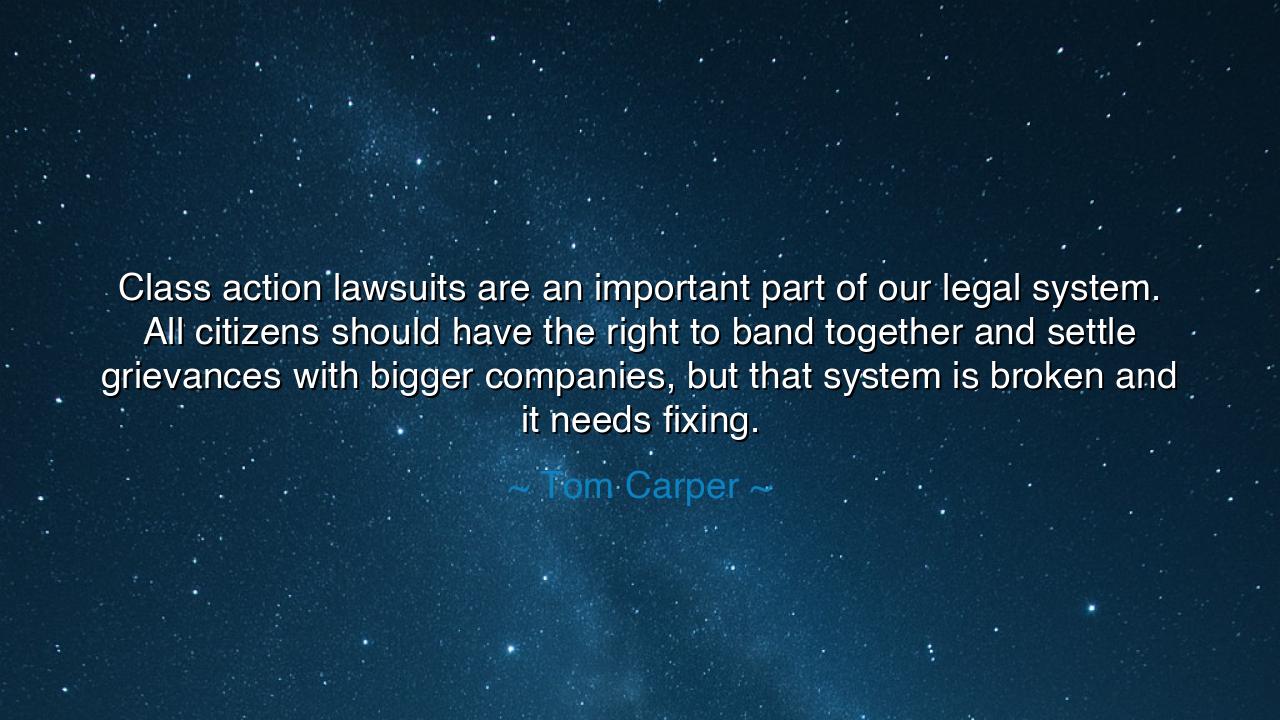
Class action lawsuits are an important part of our legal system.
Class action lawsuits are an important part of our legal system. All citizens should have the right to band together and settle grievances with bigger companies, but that system is broken and it needs fixing.






Hear the voice of Tom Carper, a servant of the republic, who declared with clarity and resolve: “Class action lawsuits are an important part of our legal system. All citizens should have the right to band together and settle grievances with bigger companies, but that system is broken and it needs fixing.” In these words resounds the cry for justice, for they speak of the eternal struggle between the many and the mighty, between the weak bound by common cause and the powerful fortified by wealth.
For what is a class action lawsuit if not the gathering of voices too small alone to be heard, but mighty when joined as one? A single citizen may fall silent when a great company wrongs him, lacking the gold or strength to fight. But when many citizens rise together, their unity becomes a shield, their chorus a thunderclap, their cause a fire that cannot be extinguished. This is the ancient principle of solidarity, reborn in the courts of law: that justice is not only for the powerful, but also for the humble, if they stand together.
Yet Carper warns that this system, though noble in design, has become broken. For the pathways of justice are too often tangled with delay, cost, and corruption. Large companies, armed with armies of lawyers, twist the very rules meant to hold them accountable. Settlements may come, but they bring pennies to the injured while rivers of gold flow to those who litigate. Thus, the weapon forged to protect the people is dulled, and trust in the law is weakened.
History itself offers echoes of this struggle. In the days of Rome, plebeians had little recourse against patricians who abused power. Only when they withdrew together in the famous “Secessio Plebis,” refusing to fight Rome’s wars until justice was granted, did they gain the Tribune of the People, a voice that could challenge the might of aristocrats. This ancient act mirrors the spirit of class actions: when the people unite, their cause can humble even the proudest. Yet if the mechanisms of unity are broken, injustice prevails, and the people’s trust withers.
We may look, too, to more recent times. The great lawsuits against tobacco companies in the twentieth century arose not from a single voice, but from millions harmed by deceit. Alone, each smoker was powerless. Together, they uncovered hidden truths, exposed decades of lies, and won judgments that reshaped an entire industry. Here we see the true power of class actions when they are allowed to flourish: the many holding the mighty to account.
What, then, is the lesson for you? It is this: never forget that your voice matters more when joined with others. Alone, your grievance may be crushed beneath the heel of wealth. Together, with others wronged as you are, you wield a strength that even empires must reckon with. But also heed Carper’s warning: systems of justice must be guarded and reformed, lest they become hollow forms where power escapes and the people’s hope is betrayed.
In your own life, do not shy from joining your cause with others. Support reforms that keep the courts open to the weak and not only to the strong. Demand laws that restore balance between citizen and corporation, and lend your hand to movements that fight corruption in the halls of justice. For justice is not a gift but a continual labor, one that must be defended by each generation.
Thus let the words of Tom Carper be your guide: the right to band together is sacred, but it must be protected and renewed. If the system is broken, do not despair, but repair it. If unity falters, rebuild it. For only when the many stand as one can the powerful be humbled and the promise of justice be made real for all.






AAdministratorAdministrator
Welcome, honored guests. Please leave a comment, we will respond soon